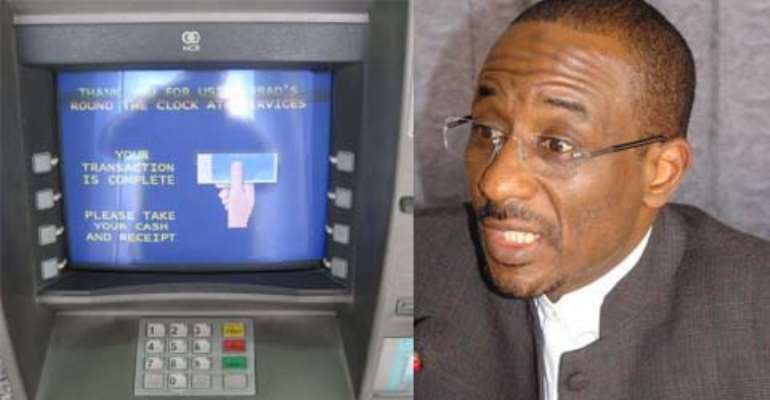Cashless policy: Policy implications on nation's economy

However, this development has been generating mixed reactions among Nigerians, especially those directly affected.
Some opine that though the policy might be good for the economy, its effective operations could be hampered by fundamental problems the country is grappling with.
Dayo Babatunde, Senior Partner, Ernst and Young, explained that the implication of the policy on the economy which largely depends on micro businesses is that it will negatively affect uneducated Nigerians.
'There are infrastructural challenges which might hamper the efficiency of the policy. These include epileptic power supply and non-availability of cash in the ATM machine.
'Lack of information technology is another issue because Nigerians do not have a robust system for managing their information. Another challenge is the aged population that will be negatively affected. All these are challenges that might hinder the policy. I wouldn't shy away from the fact that the system needs refining, modifications, enlightenment and sensitisation of the people', he asserted.
Babatunde however added that, 'We cannot fold our hands because of the risk involved in this policy. If we refuse to take on the challenges, there might be dangers in the future. Nigerians must learn how to manage risks. If we are dwelling on the challenges at hand, then there might not be a right time for it.'
For Hon. Abiodun Tobun, a lawmaker representing Epe constituency 1, Lagos State House of Assembly, the policy might be good but Nigerians are not ripe for it at the moment.
'The system is not stable, the network is not stable; therefore, most people are faced with difficulties.
'I have discovered some fraud in the policy. A situation where an individual cannot collect more than N500,000 or corporate institutes the sum of N3m without paying excessive charges. The question is, 'where does the deduction go to?' Of course, it is an online charge which is deducted by the CBN. Yet, we don't know who monitors the account so as to know how much has been generated so far.
'Another challenge is the slow transaction that individuals encounter in the course of transacting their business. There is the tendency for an individual to be exposed to multiple charges by the CBN and banks while still paying 'Charges on Turn Over', COT every month. This implies that the financial institutions are exploiting innocent individuals.
'Another constraint is the inefficiency of the Automated Teller Machine, ATM. Sometimes, most people experience difficulties in accessing it. They are then forced to be running from pillar to post in order to get the finance to meet their needs.
'Therefore, to ensure the smooth operation of this policy in Nigeria, measures should be put in place. There is a need for stable electricity supply so that one is not frustrated while trying to use the ATM. Our telecommunications providers should be monitored so they can compete globally.
Besides, some Nigerians are not educated on how to operate ATMs or credit cards. So I think it should be a gradual process.
'As much as I accept that the policy would reduce movement of bulk money from one place to the other, there is a need to put some measures in place before making it a phenomenon to be embraced by all and sundry. I believe the Nigerian economy should be experiencing massive improvement rather than allowing banks to feed fat on innocent customers.'
On the extention of the policy to five other states including the Fct, he maintained that 'Nigerians are not ripe for it until stringent measures are put in place.
'I am not saying the cashless policy is not nice, but we are not ready. Rather than extending the policy to other states, let the government of the country put some measures in place that would enhance its effectiveness. This was the position of the members of the Lagos State House of Assembly when the policy was formulated. The essence of the policy is to reduce the rate of armed robbery, money laundering as well as other vices.
'Right now, people are faced with the challenge of accessing their funds. I believe people who applauded the initiative at its inception are singing a different tune now.
'People are already complaining right now in Lagos State where it is presently operating. So if it is extended to other states, I believe it is just to the detriment of the people. The management of the CBN should conduct an independent survey on the impact of the cashless policy on the generality of the people before extending it to other states.'
Asked how the policy could be readdressed, he suggested that 'the National Assembly should come up with measures that would checkmate this policy or stop the CBN from going ahead with the programme if it continues to pose dufficulties in the lives of the people. It is a national issue and it should be handled with national interest.'
On his part, Hon. Segun Olulade, Chairman, House Committee on Information, Security, Strategy and Publicity representing Epe Constituency 11, expressed some mixed feelings. To him, the policy is a good omen for the economy, but lack of basic infrastructure is limiting its success - especially in Lagos.
As regards its extention to five other states including the FCT, his take was that the constraints involved might hamper the efficiency and effectiveness of its operations. 'The fact is our internet banking is very challenging. And it is worse when it has to do with the lives of the people as well as the economic situation of the country,' he said.
Joshua Thomas, a businessman, opined that while the policy is ideal for the well organised countries where governments encourage citizens in all spheres, it would be a disaster in Nigeria where power supply is not constant.

